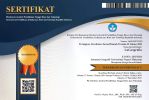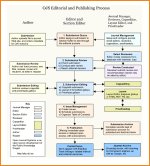Pengukuran Sikap Ilmiah Mahasiswa Pada Materi Pengaruh Aspek Geografis Terhadap Sebaran Hewan
(1) Jurusan Geografi, Fakultas Matematika dan Ilmu Pengetahuan Alam, Universitas Negeri Makassar
(2) Program Studi Pendidikan Biologi, Sekolah Tinggi Keguruan dan Ilmu Pendidikan Pembangunan Indonesia Makassar
(*) Corresponding Author
DOI: https://doi.org/10.35580/lageografia.v20i3.33280
Abstract
Scientific attitude is a habit of thinking related to scientific thinking which has implications for cognitive abilities and character in behavior. The purpose of this study was to measure and get an overview of the scientific attitude of the Makassar Indonesia Development STKIP students. Data was obtained by random sampling involving 67 semester 5 students. The instrument in this study was a questionnaire containing eight indicators including: curiosity, discipline, positive attitude towards failure, intellectual honesty, objectivity, open-mindedness, humility and cooperation. The results showed that the scientific attitude of students was still less than optimal for all aspects. It is necessary to empower scientific attitudes, among others, through innovative and creative learning strategies or models.
Abstrak
Sikap ilmiah merupakan kebiasaan berpikir yang terkait dengan pemikiran ilmiah yang berimplikasi terhadap kemampuan kognitif dan karakter di dalam perilakunya. Tujuan penelitian ini untuk mengukur dan mendapatkan gambaran umum sikap ilmiah mahasiswa STKIP Pembangunan Indonesia Makassar. Data diperoleh secara random sampling dengan melibatkan 67 mahasiswa semester 5. Instrumen dalam penelitian ini berupa kuesioner yang berisi delapan indikator meliputi: keingintahuan, kedisiplinan, bersifat positif terhadap kegagalan, kejujuran intelektual, objektivitas, berpikiran terbuka, kerendahan hati dan kerja sama. Hasil penelitian menunjukkan bahwa sikap ilmiah mahasiswa masih kurang optimal untuk semua aspek. Perlu dilakukan pemberdayaan sikap ilmiah antara lain melalui strategi atau model pembelajaran yang inovatif dan kreatif.
Keywords
Full Text:
PDFReferences
Abell, S. K., & Lederman, N. G. (2007). Research on science education. Mahwah, NJ: Lawrence Erlbaum Associates, Inc.
Aghababaei, N., Sohrabi, F., Eskandari, H., Borjali, A., Farrokhi, N., & Chen, Z. J. (2016). Predicting subjective well-being by religious and scientific attitudes with hope, purpose in life, and death anxiety as mediators. Personality and Individual Differences, 90, 93–98.
Anderson, L. W., Krathwohl, D. R., Airasian, P. W., Cruikshank, K. A., Mayer, R. E., Pintrich, P. R., Raths, J., & Wittrock, M. C. (2001). A taxonomy for learning, teaching, and assessing: A revision of Bloom’s taxonomy of educational objectives, abridged edition. White Plains, NY: Longman, 5(1).
Arikunto, S. (2021). Dasar-dasar Evaluasi Pendidikan Edisi 3. https://books.google.com/books?hl=id&lr=&id=j5EmEAAAQBAJ&oi=fnd&pg=PA1&dq=BUKU+evaluasi+pendidikan&ots=6uvQFkvLVL&sig=cJB-qSmPKi-1BUY8hH4XKUngexs
Arseculeratne, S. N. (2014). The scientific attitude (the scientific temper) in Eastern and Western societies. Anuradhapura Medical Journal, 8(1).
Ataha, U. C., & Ogumogu, A. E. (2013). An investigation of the scientific attitude among science students in senior secondary schools in Edo South Senatorial District, Edo State. Journal of Education and Practice, 4(11), 12–17.
Bogar, Y., Kalender, S., & Sarikaya, M. (2012). The effects of constructive learning method on students’ academic achievement, retention of knowledge, gender and attitudes towards science course in “matter of structure and characteristics” unit. Procedia-Social and Behavioral Sciences, 46, 1766–1770.
Buaraphan, K. (2011). The impact of the standard-based science teacher preparation program on pre-service science teachers’ attitudes toward science teaching. Journal of Turkish Science Education, 8(1), 61–78.
Creswell, J. W., & Creswell, J. D. (2017). Research design: Qualitative, quantitative, and mixed methods approaches. Sage publications.
Demirba, M. (2009). The relationships between the scientist perception and scientific attitudes of science teacher candidates in Turkey: A case study. Scientific Research and Essays, 4(6), 565–576.
Deshpande, L. (2004). Challenges in measurement of scientific attitude. EpiSTEME-1, 137.
Duda, H. J. (2015). Pengaruh model pembelajaran berbasis masalah melalui praktikum yang ditunjang asesmen autentik dan etnis terhadap kemampuan berpikir kritis, keterampilan proses sains, dan sikap ilmiah mahasiswa STKIP Persada Khatulistiwa Sintang pada matakuliah fisiologi hewan/Hilari. Universitas Negeri Malang.
Joyce, B., Weil, M., & Calhoun, E. (2003). Models of teaching.
Kartono, K. (1992). Peran Keluarga Memandu Anak. Jakarta: Rajawali Press.
Kristiani, N., Susilo, H., Rohman, F., & Aloysius, D. C. (2015). The
contribution of students’ metacognitive skills and scientific attitude towards their academic achievements in biology learning implementing Thinking Empowerment by Questioning (TEQ) learning integrated with inquiry learning (TEQI). International Journal of Educational Policy Research and Review, 2(9), 113–120.
Kyllonen, P. C. (2012). Measurement of 21st century skills within the common core state standards. Invitational Research Symposium on Technology Enhanced Assessments, 7–8.
Lacap, M. P. (2015). The scientific attitudes of students major in science in the new teacher education curriculum. Asia Pacific Journal of Multidisciplinary Research, 3(5), 7–15.
Movahedzadeh, F. (2011). Improving students’ attitude toward science through blended learning. Science Education and Civic Engagement, 3(2), 13–19.
Narmadha, U., & Chamundeswari, S. (2013). Attitude towards learning of science and academic achievement in science among students at the secondary level. Journal of Sociological Research, 4(2), 114.
Osborne, J., Simon, S., & Collins, S. (2003). Attitudes towards science: A review of the literature and its implications. International Journal of Science Education, 25(9), 1049–1079.
Patil, G. V. (2011). A comparative study os scientific attitude about secondary and higher secondary level students. International Referred Research Journal, II, 24–26.
Pitafi, A. I., & Farooq, M. (2012). Measurement of scientific attitude of secondary school students in Pakistan. Academic Research International, 2(2), 379.
Prokop, P., Tuncer, G., & Chudá, J. (2007). Slovakian students’
attitudes toward biology. Eurasia Journal of Mathematics, Science and Technology Education, 3(4), 287–295.
Saribas, D., & Bayram, H. (2009). Is it possible to improve science process skills and attitudes towards chemistry through the development of metacognitive skills embedded within a motivated chemistry lab?: A self-regulated learning approach. Procedia-Social and Behavioral Sciences, 1(1), 61–72.
Savelsbergh, E. R., Prins, G. T., Rietbergen, C., Fechner, S., Vaessen, B. E., Draijer, J. M., & Bakker, A. (2016). Effects of innovative science and mathematics teaching on student attitudes and achievement: A meta-analytic study. Educational Research Review, 19, 158–172.
Sekar, P., & Mani, S. (2013). Science attitude of higher secondary students. Indian Journal of Research, 2(1), 50–52.
Setiawati, L. (2011). Pengaruh Kompetensi Sosial Guru IPS Terhadap Motivasi Dan Prestasi Belajar Siswa Kelas VIII Pada Mata Pelajaran Ilmu Pengetahuan Sosial (IPS) Di MTs Negeri Lawang Malang.
Simpson, R. D., & Oliver, J. S. (1990). A summary of major influences on attitude toward and achievement in science among adolescent students. Science Education.
Singh, V. K., Singh, A. K., & Giri, A. (2016). A study of the relationship between scientific attitude and academic achievement of rural area’s intermediate college girls (science stream only). International Journal of Applied Research, 2(4), 46–49.
Suryawati, E., Osman, K., & Meerah, T. S. M. (2010). The effectiveness of RANGKA contextual teaching and learning on students’ problem solving skills and scientific attitude. Procedia-Social and Behavioral Sciences, 9, 1717–1721.
Tasdemir, A., Kartal, T., & Kus, Z. (2012). The use of out-of-the-school learning environments for the formation of scientific attitudes in teacher training programmes. Procedia-Social and Behavioral Sciences, 46, 2747–2752.
Yousefi, S., & Mohammadi, M. (2016). Critical thinking and reading comprehension among postgraduate students: The case of gender and language proficiency level. Journal of Language Teaching and Research, 7(4), 802.
Zhang, D., & Campbell, T. (2011). The psychometric evaluation of a three-dimension elementary science attitude survey. Journal of Science Teacher Education, 22(7), 595–612.
Zubaidah, Siti. (2016). Keterampilan abad ke-21: Keterampilan yang diajarkan melalui pembelajaran. Seminar Nasional Pendidikan, 2(2), 1–17.
Zubaidah, SUMJ, & UM, J. (2017). Pembelajaran kontekstual berbasis pemecahan masalah untuk mengembangkan kemampuan berpikir kritis. Makalah Disampaikan Pada Seminar Nasional Dengan Tema Inovasi Pembelajaran Berbasis Pemecahan Masalah Dalam Pembelajaran Biologi Di Universitas Muhammadiyah Makasar, Makasar, 6.
Article Metrics
Abstract view : 183 times | PDF view : 57 timesRefbacks
Copyright (c) 2022 Muhammad Yusuf

This work is licensed under a Creative Commons Attribution-NonCommercial 4.0 International License.
LaGeografia: Jurnal Program Studi Pendidikan Geografi, Jurusan Geografi, Fakultas MIPA, Universitas Negeri Makassar.
Email: lageografia@unm.ac.id | +6285298749260
Editorial Office













































